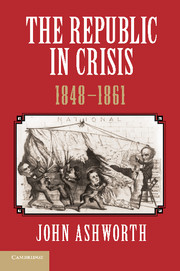Book contents
- Frontmatter
- Contents
- List of Maps and Cartoons
- Chronology of Events
- Introduction
- 1 The United States in 1848
- 2 Crisis at Mid-century, 1848–1851
- 3 Immigrants, Alcoholics and Their Enemies
- 4 Preparing for Disaster
- 5 Political Maelstrom, 1854–1856
- 6 North and South, Republican and Democrat
- 7 Political Polarisation, 1857–1860
- 8 Secession and the Outbreak of War, 1860–1861
- 9 Conclusion
- INDEX
- References
3 - Immigrants, Alcoholics and Their Enemies
Ethnocultural Issues, 1851–1854
Published online by Cambridge University Press: 05 September 2012
- Frontmatter
- Contents
- List of Maps and Cartoons
- Chronology of Events
- Introduction
- 1 The United States in 1848
- 2 Crisis at Mid-century, 1848–1851
- 3 Immigrants, Alcoholics and Their Enemies
- 4 Preparing for Disaster
- 5 Political Maelstrom, 1854–1856
- 6 North and South, Republican and Democrat
- 7 Political Polarisation, 1857–1860
- 8 Secession and the Outbreak of War, 1860–1861
- 9 Conclusion
- INDEX
- References
Summary
By the early 1850s, at the time the slavery question was causing alternating waves of consternation and complacency, politics in the nation were also heavily influenced by two other issues, which historians often describe as “ethnocultural”. For some years temperance reformers had been active in some states of the Union, seeking to reform not merely the alcoholic but also, in part in order to ensure that he did not become an alcoholic in his turn, the occasional tippler. In other words Prohibition of alcohol became the stated goal of these enthusiasts. A little later an even more important movement developed when opposition to the political power of immigrants crystallised into what was universally referred to as the Know Nothing party. Prohibition had a significant impact on politics in some states; the Know Nothing, or, as it was formally known, the American party had, if only for a brief period, a still larger one in most states and at the federal capital too.
By 1852 the temperance movement was entering upon its era of greatest success, at least before its famous triumph in the twentieth century. Originating in the early nineteenth century in an attempt to prevent, at local level and by the use of moral suasion only, the intemperate use of alcohol, it changed in the 1830s as reformers began to demand total abstinence, enforced by laws that would be state-wide in their operation.
- Type
- Chapter
- Information
- The Republic in Crisis, 1848–1861 , pp. 65 - 79Publisher: Cambridge University PressPrint publication year: 2012



